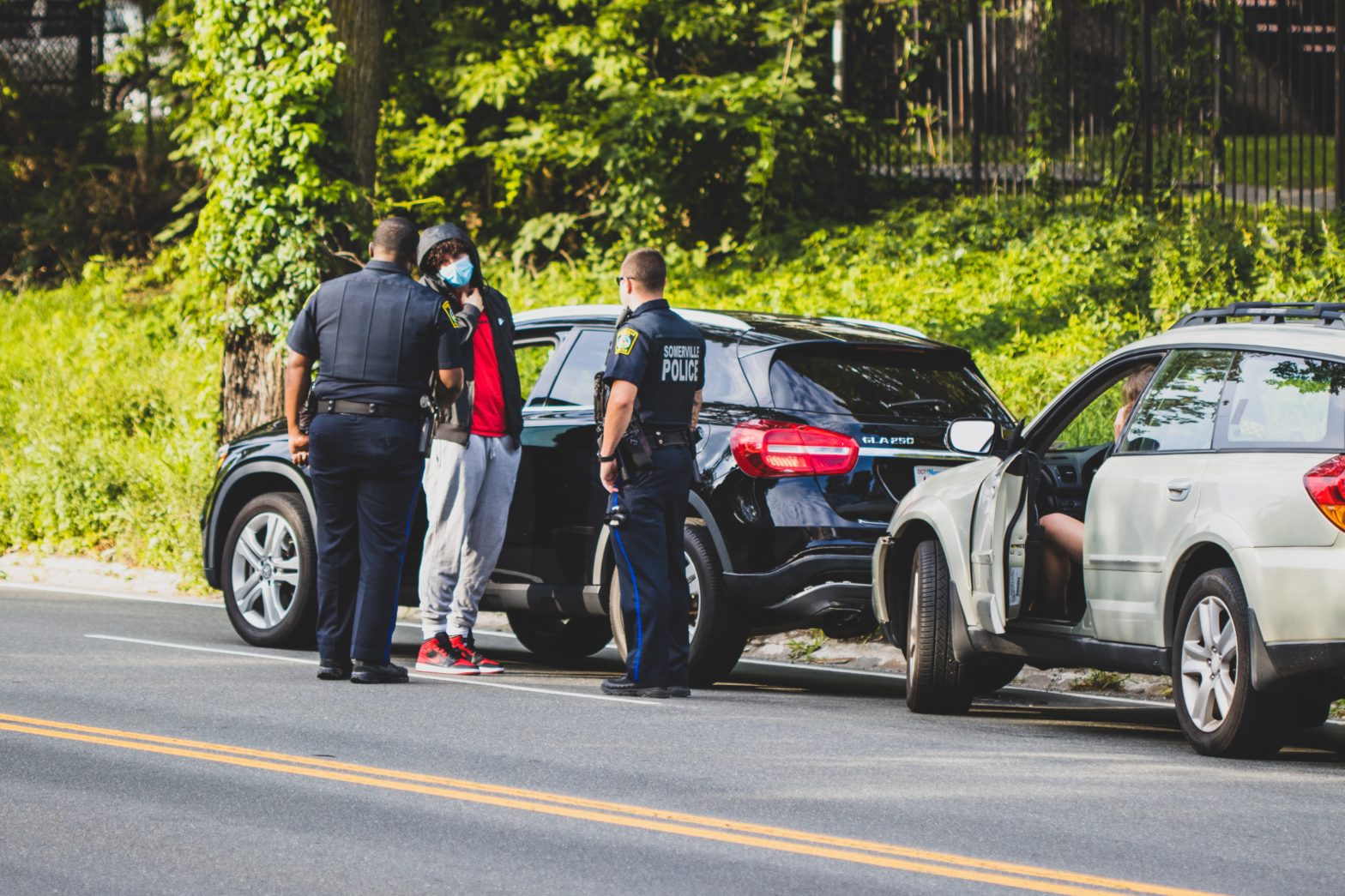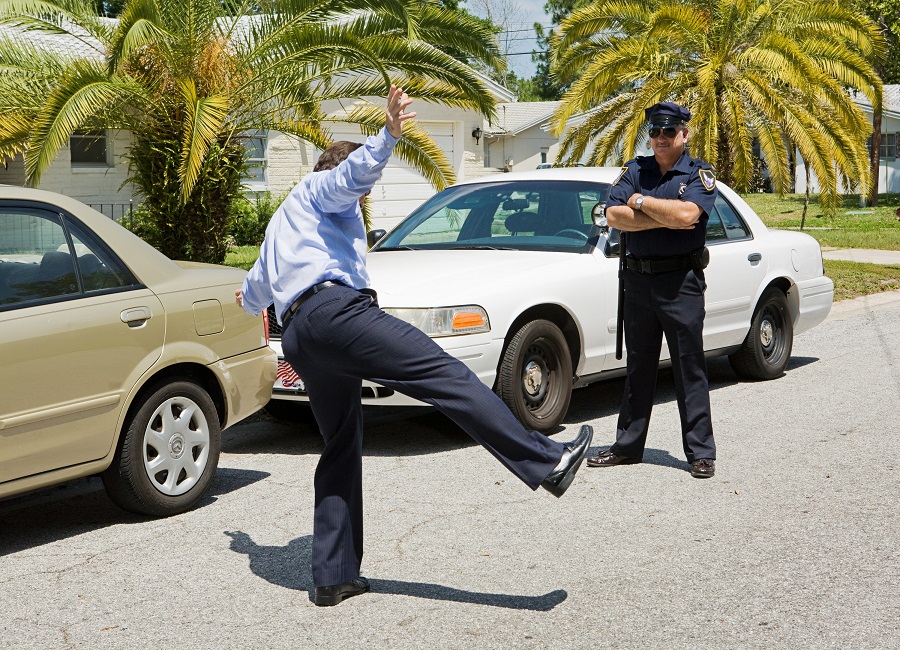If there’s anything we can learn from this video clip from the comedy show Reno 911, it’s that Field Sobriety Tests can be ridiculously unnecessary, and oftentimes lead to self-incrimination. However, if you know your rights and are certain about what you should do during a DUI stop, your chances of being convicted for DUI are greatly reduced.
If you are stopped for DUI, you will likely be asked to take a field sobriety test. Here’s a brief guide that will help you avoid a DUI conviction by knowing how to handle a DUI stop and subsequent field sobriety tests.
Show Police Your Driver’s License and Vehicle Registration
You are legally required to show the officer your license and registration if asked to do so. If you refuse, police can search your car in any areas where it may be reasonable to put those documents.
Do Not Answer Any Questions
You can politely refuse to answer any questions that police ask you. This is your constitutional right. The police don’t have a duty to inform you of this right until you are arrested, when they will state your Miranda rights to you. You can inform officers that you are exercising your right to remain silent.
There is no good reason to talk to a police officer during a DUI stop. Whatever conversation you engage in may be used against you, and the police may claim to have smelled alcohol on your breath, or that your speech was slurred.
Common Field Sobriety Tests

The most common field sobriety tests that you could be asked to take include:
- Horizontal Gaze Nystagmus (HGN) – During this test, a police officer will wave a pen or finger in front of your face and ask you to follow it with your eyes. However, there are many factors aside from being intoxicated that could cause you to fail this test. There is a 25-step process outlined for officers administering these tests. An experienced attorney can prove that the way you took the test was not in accordance with these 25 steps.
- One Leg Stand Test – This test requires you to balance on one foot while also counting or following some other instruction. If you lose your balance or extend your hands out too far in order to maintain your balance, you could fail this test. This test requires a level of coordination and physical fitness that many people don’t have no matter if they are drunk or sober.
- Walk and Turn Test – During this test, the police officer will direct you to walk a straight line and then turn. You are instructed to stand on the line with one foot directly in front of the other, and must not begin until told to. You are being graded on how you stand there before the test “begins.” For practical purposes, the testing has already begun before you are told to begin the test, and if you lose your balance when standing in the unnatural position waiting for the test to begin, you could fail this test.
Refuse to Take Field Sobriety Tests
Field sobriety tests are voluntary, but police are not required to inform you of this fact. There is no good reason to submit to a field sobriety test, but there are many good reasons to decline to take one. Some of these reasons include:
- The tests are inaccurate
- The results are open to interpretation by the officer conducting the test
- The tests are hard for anybody to pass, whether drunk or sober
- You will be subjecting yourself to a difficult and humiliating ordeal
- The test results can be used as evidence against you in court or at a DMV hearing
Refuse Blood-Alcohol Tests

If you are 21 years of age or older, you are not legally required to submit to a test of your blood-alcohol content unless you are placed under arrest. There are two types of chemical tests that you could be asked to take:
- Breathalyzer – You blow into a machine that measures the alcohol content in your breath
- Blood test – Blood is drawn from your body and tested to find your blood-alcohol content level
If you are not under arrest, you should refuse to submit to a test. Once you are placed under arrest, your consent to submit to a blood test is implied under the California Implied Consent Rule.
California Implied Consent Rule (CVC 23612)
The California Implied Consent Rule under Vehicle Code section 23612 states that if you are placed under arrest for driving under the influence of drugs and/or alcohol, you are deemed to have given consent to chemical testing of your blood or breath. If you still refuse to submit to a test, you are subject to the following consequences:
- Suspension of your driver’s license for one year if convicted
- Suspension of your driver’s license for two years if you refuse the chemical test for a second time in 10 years
- Suspension of your driver’s license for three years if you have a prior DUI conviction
- Mandatory imprisonment and a fine of $125 if you are convicted of DUI
You have a right to be warned of these consequences when you are placed under arrest.
What Blood-Alcohol Test Should I Take?
A Breathalyzer test is the most readily available and least invasive test. It will only measure your blood-alcohol content level, not other substances. However, a breath test result cannot be re-tested. If you are under suspicion of impairment by drugs, you may not have this option.
Breathalyzer tests are prone to error, so an experienced DUI attorney may be able to question the results of this test if you are charged with DUI.
Call Wallin & Klarich Today

If you or a loved one has been arrested for DUI, you need to talk to an experienced attorney immediately. At Wallin & Klarich, our skilled DUI defense attorneys have been successfully defending our clients for more than 30 years. We can analyze the facts of your case and plan a defense strategy that will get you the best outcome possible in your case.
With offices located in Los Angeles, Sherman Oaks, Torrance, Orange County, San Diego, Riverside, San Bernardino, Ventura, West Covina and Victorville, there is an experienced Wallin & Klarich DUI attorney available to help you no matter where you work or live.
Call us today at (877) 4-NO-JAIL or (877) 466-5245 for a free phone consultation. We will get through this together.



